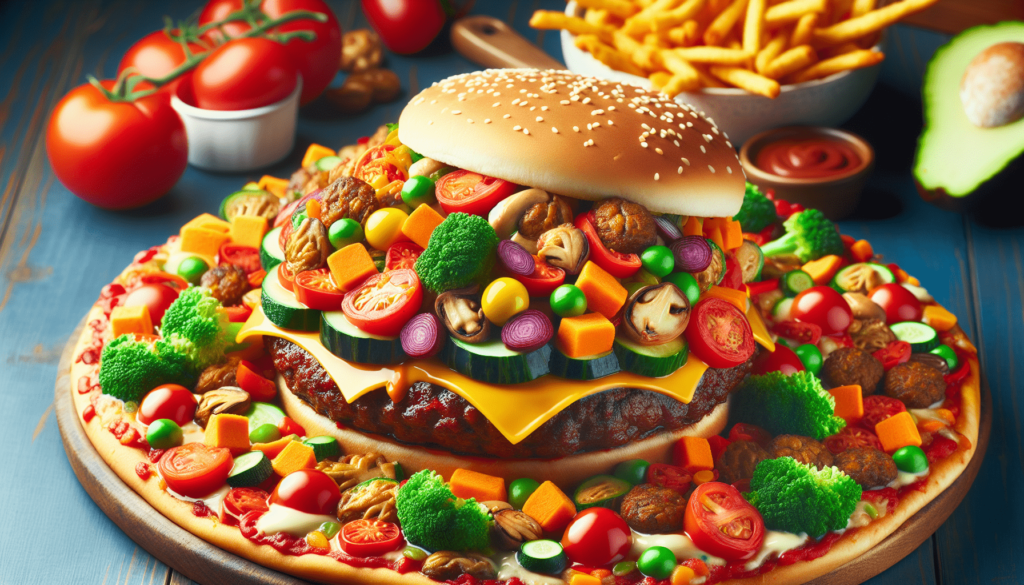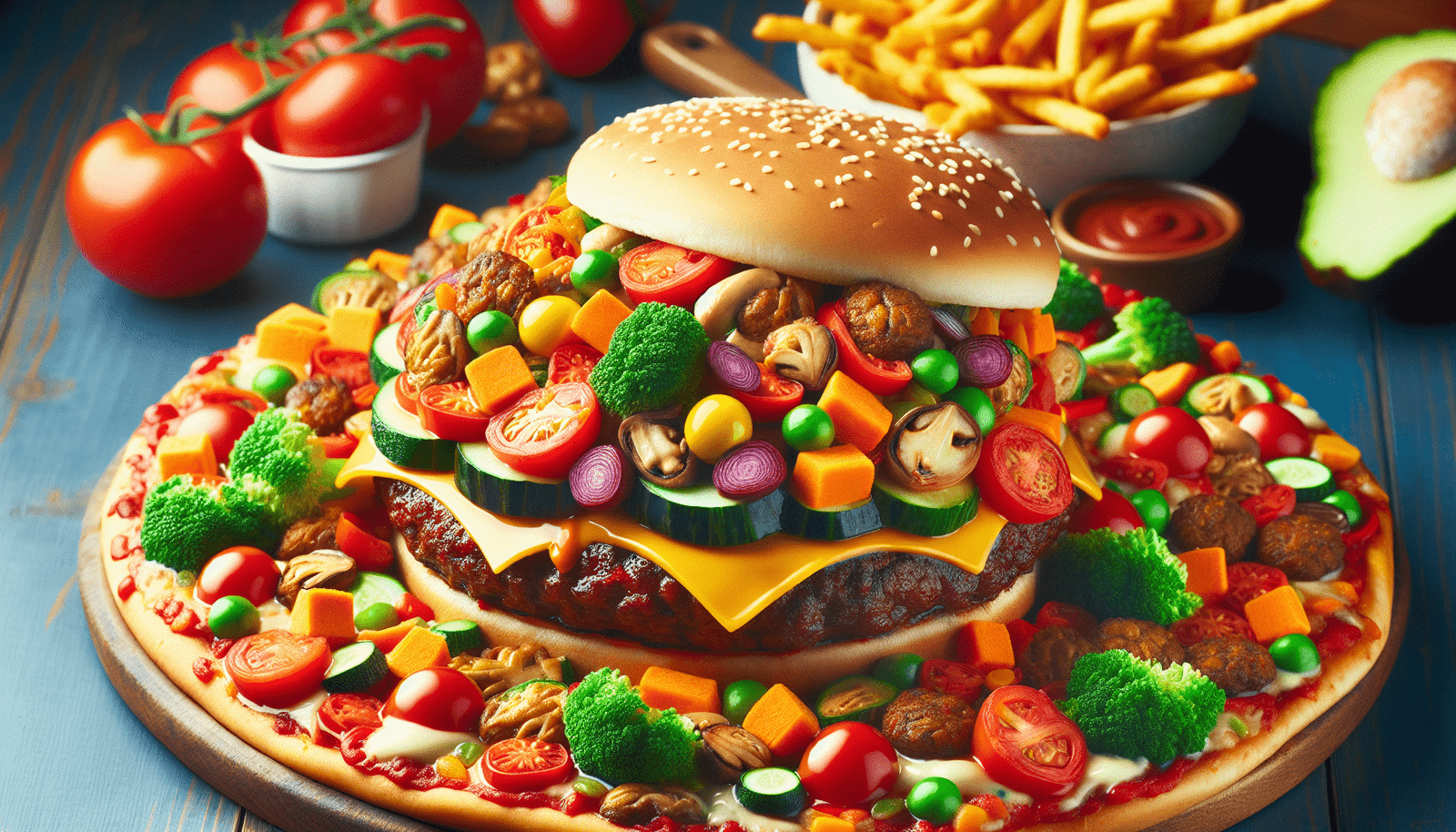Imagine a world where you can indulge in all your favorite junk food guilt-free, without any animal products. It may seem too good to be true, but with the rise of vegan junk food options, this dream has become a delicious reality. From vegan burgers and pizzas to ice cream and cookies, plant-based alternatives are taking the junk food scene by storm. But is vegan junk food really better for you? In this article, we’ll explore the pros and cons of indulging in this tasty trend and uncover whether it’s truly a healthier alternative or just a clever marketing strategy. So, grab a vegan donut and let’s dig in!

Definition of Vegan Junk Food
Vegan junk food refers to processed food that is made without any animal products but is still considered to be indulgent and unhealthy. It combines the principles of veganism, which avoids the use of animal products, with the concept of junk food, which typically refers to foods that are high in calories, fat, and sugar.
Explanation of veganism
Veganism is a lifestyle that abstains from the use of animal products in all aspects of life, including diet, clothing, and cosmetics. A vegan diet excludes meat, dairy, eggs, and any other animal-derived ingredients. Vegans choose this lifestyle for various reasons, including ethical concerns for animals, environmental sustainability, and health benefits.
Explanation of junk food
Junk food is commonly characterized as food that is palatable, but lacks nutritional value. It is often high in calories, unhealthy fats, sugar, and sodium, while being low in essential vitamins, minerals, and fiber. Junk food is typically associated with processed snacks, fast food, sugary beverages, and desserts.
Definition of vegan junk food
Vegan junk food can be defined as processed food that does not contain any animal products but still falls under the category of unhealthy indulgence. This can include vegan versions of popular junk food items such as burgers, pizza, ice cream, donuts, and candy. These foods are often created using plant-based ingredients and alternative substitutes for animal products.
Popular Vegan Junk Food Choices
Vegan burgers
Vegan burgers have gained significant popularity in recent years, with various plant-based patties available on the market. These burgers are typically made from ingredients such as soy, pea protein, or mushrooms, and are designed to resemble the taste and texture of traditional beef burgers. They are often served with vegan cheese, lettuce, tomato, and other toppings, providing a delicious alternative for those who crave a classic burger experience.
Vegan pizza
Vegan pizza has become a staple in many households and restaurants. Instead of using dairy cheese, vegan pizzas use plant-based alternatives made from ingredients like cashews, almond milk, or soy. These pizzas are topped with a variety of vegan-friendly ingredients such as vegetables, vegan sausage, and dairy-free cheese substitutes. They allow individuals to enjoy the flavors and comfort of pizza without the use of animal products.
Vegan ice cream
Vegan ice cream has seen a significant increase in popularity as more people embrace plant-based diets. It is typically made from bases such as coconut milk, almond milk, or soy milk, instead of traditional dairy ingredients. Vegan ice cream comes in a variety of flavors and can be found in both traditional and novelty forms. It offers a guilt-free indulgence for those who want to enjoy a sweet treat without consuming animal products.
Vegan donuts
Vegan donuts have gained a dedicated following among vegans and non-vegans alike. These donuts are made without eggs, dairy, or any other animal products, but still retain the delicious taste and texture of traditional donuts. They are often coated in vegan-friendly glazes or fillings, providing a wide array of flavors to satisfy any donut lover’s cravings.
Vegan candy
Vegan candy options have expanded significantly, allowing individuals to satisfy their sweet tooth without compromising their vegan lifestyle. Vegan candy can be made from plant-based ingredients like fruit juices, natural flavors, and alternative sweeteners. From gummy bears to chocolate-covered treats, vegan candies offer a guilt-free indulgence for those who enjoy sweets.
Health Benefits of Vegan Junk Food
While vegan junk food may not be considered healthy in the traditional sense, it does offer some potential health benefits when compared to its animal-based counterparts. These benefits include:
Lower cholesterol levels
Since vegan junk food is free from cholesterol, it can help lower overall cholesterol levels in the body. Diets high in cholesterol have been linked to an increased risk of heart disease and other cardiovascular issues. By opting for plant-based alternatives, individuals can reduce their intake of dietary cholesterol and improve their overall heart health.
Reduced risk of heart disease
Adopting a vegan lifestyle, which includes choosing vegan junk food options, has been associated with a reduced risk of heart disease. Vegan diets typically include higher amounts of fiber, antioxidants, and heart-healthy fats from sources like nuts and seeds. These dietary components can help lower blood pressure, reduce inflammation, and improve overall cardiovascular health.
Increased fiber intake
Vegan junk food made from whole plant-based ingredients, such as whole grains and fruits, can contribute to a higher fiber intake. Fiber is essential for maintaining a healthy digestive system, as it aids in digestion, prevents constipation, and promotes a feeling of fullness. High-fiber diets have also been linked to a decreased risk of developing chronic diseases like diabetes, obesity, and certain types of cancer.
Higher vitamin and mineral content
Vegan junk food can provide individuals with a higher intake of essential vitamins and minerals found in plant-based ingredients. Fruits, vegetables, legumes, and whole grains are abundant in vitamins A, C, E, and K, as well as minerals like potassium, magnesium, and folate. These nutrients play a vital role in maintaining overall health and well-being.
Decreased intake of unhealthy additives
By choosing vegan junk food options, individuals can reduce their consumption of unhealthy additives commonly found in animal-based processed foods. These additives include artificial preservatives, colors, flavors, and high levels of sodium. Vegan alternatives often rely on natural ingredients, making them a healthier choice for those looking to avoid these harmful additives.

Nutritional Concerns
While vegan junk food offers some health benefits, it is important to be aware of the potential nutritional concerns associated with these indulgent treats. It is crucial to consume them in moderation and balance them out with healthier food choices. Some common nutritional concerns include:
Highly processed ingredients
Many vegan junk food products are highly processed. Processing can strip away essential nutrients and introduce unhealthy additives, such as artificial flavors and preservatives. It is important to read the ingredient labels carefully and choose products made from whole, minimally processed ingredients whenever possible.
Excessive sodium levels
Vegan junk food, like its non-vegan counterparts, can be high in sodium. Excessive sodium intake is linked to an increased risk of high blood pressure, heart disease, and stroke. It is essential to be mindful of sodium content and choose lower sodium options or moderate portion sizes to keep sodium intake in check.
Added sugars and sweeteners
While vegan junk food may not contain animal-derived ingredients, it can still be high in added sugars and sweeteners. Excessive sugar consumption is associated with various health issues, including weight gain, diabetes, and an increased risk of heart disease. It is important to limit the intake of sweets and opt for healthier vegan alternatives whenever possible.
Lack of essential nutrients
Although vegan junk food may offer certain health benefits, it can lack some essential nutrients found in animal-based products. Nutrients like complete proteins, vitamin B12, iron, and omega-3 fatty acids are commonly found in animal-derived foods. Vegans need to be mindful of incorporating alternative sources of these nutrients into their diets through fortified products or supplementation.
Caloric density
Vegan junk food, like traditional junk food, can be high in calories. Consuming excessive calories from junk food, even if it is vegan, can lead to weight gain and related health issues. It is important to practice portion control and balance higher-calorie options with nutrient-dense whole foods to maintain a healthy weight and overall well-being.
Environmental Impact
Aside from health considerations, the environmental impact of vegan junk food is another aspect to consider. Choosing vegan options can have significant benefits for the planet. Some environmental impacts to consider include:
Plant-based vs. animal-based agriculture
Animal agriculture is a significant contributor to greenhouse gas emissions, deforestation, and water pollution. By opting for vegan junk food made from plant-based ingredients, individuals can minimize their carbon footprint and reduce the demand for animal agriculture, which has a significant environmental impact.
Water usage
Animal agriculture is notorious for its high water consumption. Growing crops for animal feed, providing water for livestock, and cleaning animal facilities all contribute to water scarcity. Producing vegan junk food requires fewer water resources compared to producing animal-based junk food, making it a more sustainable choice.
Deforestation
The production of animal-based junk food often leads to deforestation, particularly for grazing land and for growing feed crops. Deforestation contributes to habitat loss, loss of biodiversity, and increased greenhouse gas emissions. By choosing vegan junk food options, individuals can play a role in preserving forests and protecting natural ecosystems.
Greenhouse gas emissions
Animal agriculture is a significant contributor to greenhouse gas emissions, particularly methane and nitrous oxide. These gases contribute to climate change and global warming. Opting for vegan junk food options can help reduce the demand for animal agriculture and its associated greenhouse gas emissions, thus promoting a more sustainable future.
Ethical Considerations
Apart from the health and environmental aspects, ethical considerations are important when discussing vegan junk food. Some ethical aspects to consider include:
Animal welfare concerns in conventional junk food
The production of conventional junk food often involves the use of factory-farmed animals, who may endure harsh living conditions and poor treatment. By choosing vegan junk food alternatives, individuals can help minimize the demand for products that contribute to animal suffering and support companies that prioritize animal welfare.
Cruelty-free alternatives
Vegan junk food provides an opportunity to enjoy indulgent treats without contributing to animal exploitation. By supporting vegan brands and products, individuals can choose cruelty-free alternatives that align with their ethical values. This allows them to indulge in their favorite snacks while remaining true to their compassion for animals.
Supporting vegan businesses
Choosing vegan junk food options supports businesses that are committed to sustainability, animal welfare, and ethical practices. By investing in these companies, individuals contribute to the growth of the vegan market and promote a shift towards more ethical and compassionate choices in the food industry.
Availability and Affordability
The availability and affordability of vegan junk food have improved significantly in recent years, thanks to an increased demand for plant-based alternatives. Some considerations regarding availability and affordability include:
Growing availability of vegan junk food options
The demand for vegan junk food has led to a significant increase in options available in supermarkets, restaurants, and online retailers. From vegan-friendly fast-food chains to specialty vegan food stores, individuals now have a wide variety of choices when it comes to vegan junk food. This increased availability makes it easier for people to incorporate these indulgent treats into their diet.
Price comparison with non-vegan junk food
While some vegan junk food options may be more expensive than their non-vegan counterparts, the price difference has been decreasing as the market grows. Additionally, making homemade vegan junk food can be more cost-effective. With proper meal planning and ingredient substitution, individuals can enjoy vegan indulgences without breaking the bank.
Accessibility in different regions
The availability of vegan junk food may vary depending on the region and local food culture. Urban areas and regions with a higher demand for vegan products tend to offer more choices. However, as veganism continues to gain popularity worldwide, the accessibility of vegan junk food is gradually expanding to accommodate different regions and communities.
Moderation and Balance
While indulging in vegan junk food can be enjoyable, it is important to practice moderation and balance in overall dietary choices. Some considerations for maintaining a balanced diet include:
Importance of moderation in overall diet
Vegan junk food, like any other indulgent food, should be consumed in moderation. While it can be tempting to indulge in these treats regularly, excessive consumption can lead to health issues. It is important to incorporate a variety of nutrient-dense whole foods into the diet and limit the intake of high-calorie, low-nutrient options.
Balancing vegan junk food with healthier options
To maintain a balanced diet, it is essential to balance vegan junk food with healthier choices. Incorporating ample amounts of fruits, vegetables, whole grains, legumes, and plant-based proteins ensures a well-rounded nutritional intake. Balancing indulgent treats with nutrient-dense foods helps provide the body with essential vitamins, minerals, and fiber for optimal health.
Reading labels and understanding ingredient lists
When choosing vegan junk food options, it is crucial to read labels and understand the ingredient lists. Some vegan junk food may still be high in unhealthy fats, sugars, and additives. By being mindful of the nutritional content and ingredient quality, individuals can make informed decisions and select healthier vegan alternatives.
Personal Preferences and Taste
Personal preferences and taste play a significant role in the consumption of vegan junk food. Some considerations in this aspect include:
Subjectivity in taste preferences
Taste preferences vary from person to person, and what one individual considers satisfying may not be as appealing to another. Luckily, there is a wide range of vegan junk food options available to cater to different taste preferences. Exploring and trying different brands and flavors allows individuals to find their favorite vegan indulgences that suit their personal taste buds.
Exploring different vegan junk food brands
The market for vegan junk food is expanding rapidly, and numerous brands are offering a variety of options. Each brand has its own unique recipes, flavors, and textures, providing individuals with the opportunity to try different products and discover their favorites. Exploring different brands ensures a diverse and enjoyable vegan junk food experience.
Finding healthier alternatives for specific cravings
Cravings for specific junk food items can be satisfied with healthier alternatives. Individuals can experiment with homemade recipes or seek out vegan versions of their favorite treats. With some creativity and the abundance of online resources, it’s possible to find alternatives that are not only vegan but also incorporate more wholesome ingredients.
Conclusion
Deciding whether or not to indulge in vegan junk food ultimately comes down to individual choices and priorities. With the growing popularity of veganism, increased availability, and the understanding of health and environmental benefits, choosing vegan junk food can be a viable option for those who crave indulgence without compromising their values.
It is essential to weigh factors such as health, ethics, and environmental impact when making decisions about vegan junk food. Practicing moderation, reading labels, and maintaining balance by incorporating nutrient-dense whole foods are key to enjoying vegan junk food while maintaining overall well-being.
Ultimately, individuals have the power to make informed choices that align with their values and prioritize their health, ethics, and the environment. By considering all aspects and being mindful of their dietary decisions, individuals can enjoy the pleasures of vegan junk food without sacrificing their personal well-being or the well-being of the planet.

